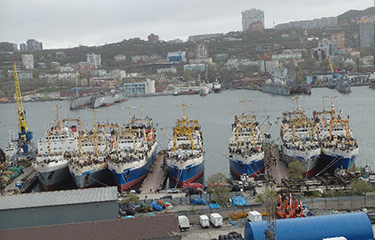Russian fishing industry blasts new limits on vessels of foreign origin

Russian fishing companies are worried a new rules issued by the government banning ships built, purchased, or serviced outside of European Asian Economic Union (EAEU) – Russia, Kazakhstan, Belarus, Armenia, and Kyrgyzstan – from fishing in Russian waters will cause higher seafood prices at retail and a decline in catch.
Over the past few years, fishing ships built, purchased, or serviced abroad have been banned from landing catch at Russian ports, but were still allowed to obtain quotas and fish in Russia's exclusive economic zone, provided they received clearance to land their catch from the Russian Customs Service.
However, fishing companies were often reluctant to go through the clearance process, wary of paying customs duties of 5 percent of the ship’s cost and a value-added tax (VAT) of 20 percent. The companies could also easily find customers in other countries like Norway, China, South Korea, and Japan, thereby avoiding the fees.
In response, Russian authorities have ramped up efforts to steer more domestic catch through Russia. Two years ago, a so-called customs amnesty was declared, waiving the 5 percent customs duty. However, Russian Federal Agency for Fisheries Head Ilya Shestakov acknowledged “the amnesty was not sufficient,” and few companies took up the opportunity, with the number of uncleared ships decreasing from 90 to 69.
On 31 December, 2020, the Russian government issued its resolution prohibiting ships built, purchased, or serviced outside of the EAEU from receiving any quota for fishing in domestic waters, starting in 2022.
In January, the All-Russian Association of Fishing Industry (VARPE) contacted Russian Prime Minister Mikhail Mishustin urging him to postpone implementation of the resolution until 1 January, 2024, and to establish a transition period during which fisheries could raise money to pay the duties and VAT required to pass the clearance procedure.
VARPE said as a result of the new regulation, impacted companies will collectively owe RUB 25 billion (USD 323.8 million, EUR 272.8 million), with other associated losses increasing the total to RUB 4 billion (USD 51.8 million, EUR 43.7 million). That’s in contrast to the figure Russia's Federal Agency for Fisheries calculated, which was RUB 1.82 billion (USD 23.6 million, EUR 19.9 million).
Union of Fisheries of the North (UFN) General Director Konstantin Drevetnyak said in an interview with Kommersant that the attempt to get Russian companies to service and repair ships in Russia will cause issues, as the country does not have sufficient capacity to handle the work.
The letter from VARPE was followed by a letter from several individual companies affected by the change.
In late March, Russian Vice Premier Victoria Abramchenko was contacted by Vladimir Rekasov, the CEO of Tralflot and Sofco, who warned the entire domestic fishing sector is threatened by the new rule. Tralflot and Sofco operate three trawlers built in Spain in the 1990s. Equipped and modernized in Russia, the ships are now among the most productive in the world, with each vessel catching up to 80,000 metric tons (MT) of fish a year – half of which is sardine iwashi and mackerel.
The catch of iwashi – a popular species in the Soviet era – hit a historical high in 1990, when 484,400 MT was caught. Soon after, iwashi abandoned Russian waters and only returned two decades later, and Russian fishermen resumed fishing it in 2016. In 2020, the catch was 313,000 MT. The flavor of iwashi is similar to herring, a popular fish in Russia. Together, Tralflot and Sofco caught 56,600 MT of sardine iwashi last year, and other vessels considered “imported” under the new rules collectively caught 158,200 MT of sardine iwashi in 2020, around half the entire domestic catch.
At the moment, Rekasov wrote, sardine iwashi is the cheapest fish in Russia, with one kilogram of the species selling for RUB 45 (0.58 USD, 0.49 EUR). In contrast, one kilogram of pollock typically costs around RUB 68 (USD 0.88, EUR 0.74) and Pacific herring costs RUB 65 (USD 0.84, EUR 0.70), he said. Rekasov said the new requirements will essentially destroy the iwashi fishery, and as a result, he wrote in support of the VARPE initiative to postpone the enforcement of the resolution.
Rekasov said it will cost USD 12.5 million (EUR 10.52 million) to comply with the new mandate, as each one of the company’s trawlers cost USD 50 million (EUR 42.1 million). Being forced to pay that amount would seriously jeopardize the companies’ finances, he wrote. Rekasov said total taxes the company would owe through 2021 would be at least RUB 3 billion (USD 38.9 million, EUR 32.7 million), twice as much as the total revenue of the companies in 2020. As an additional blow, he said his companies will see lower revenues due to disruptions in seafood exports from Russia to China, and additional debt taken from financing the construction of crab ships as part of the country’s new investment quota system.
“We don’t mind paying the customs duties and VAT. The problem is that we have to pay them at once,” Rekasov told business paper RBC.
Rekasov said other fishing companies are in the same boat, meaning it’s likely many will quit low-profit species and switch to more sought-after ones. The price for sardine iwashi would then likely increase.
Other companies are also monitoring the situation. Norebo Deputy CEO Sergey Sennikov said the forced customs clearance will eat into the company’s profits, forcing it to opt for more lucrative species to compensate for the losses. In 2020, Norebo caught more than 100,000 MT of iwashi.
In response to the complaints, Abramova ordered the Russian Ministry of Agriculture and the Federal Agency for Fisheries to review the issues raised by the industry and propose possible solutions. After that announcement, Shestakov said that a transparent procedure for customs clearance is needed.
“At the moment, neither the Customs Service nor fishermen understand how to do customs clearance. The government bodies in charge of the issue should organize the procedure so that fisheries could pass it fast,” he said at a press conference – avoiding mention of the controversial financial aspects of the situation.
Photo courtesy of Russian Fishery Company






Share